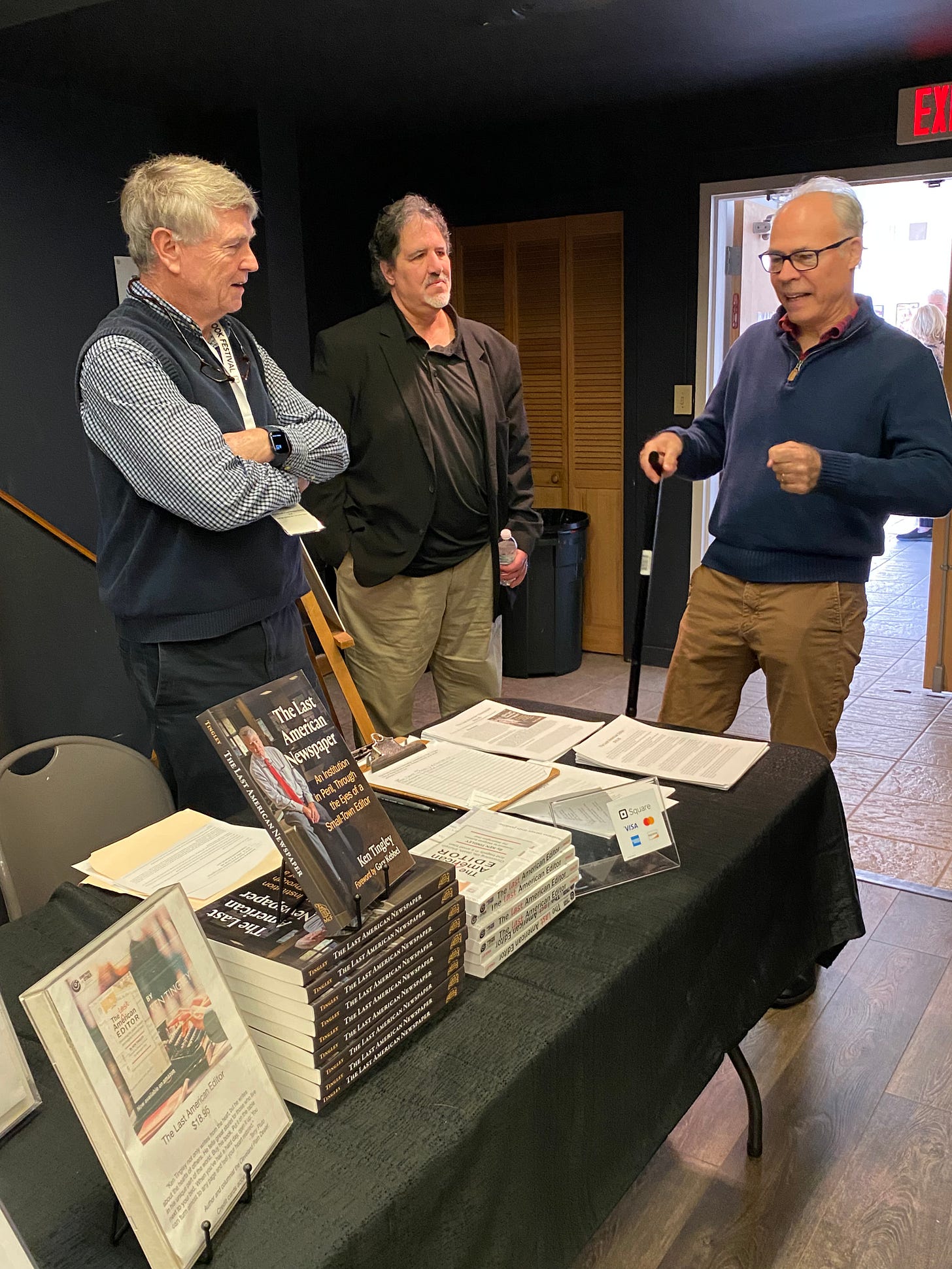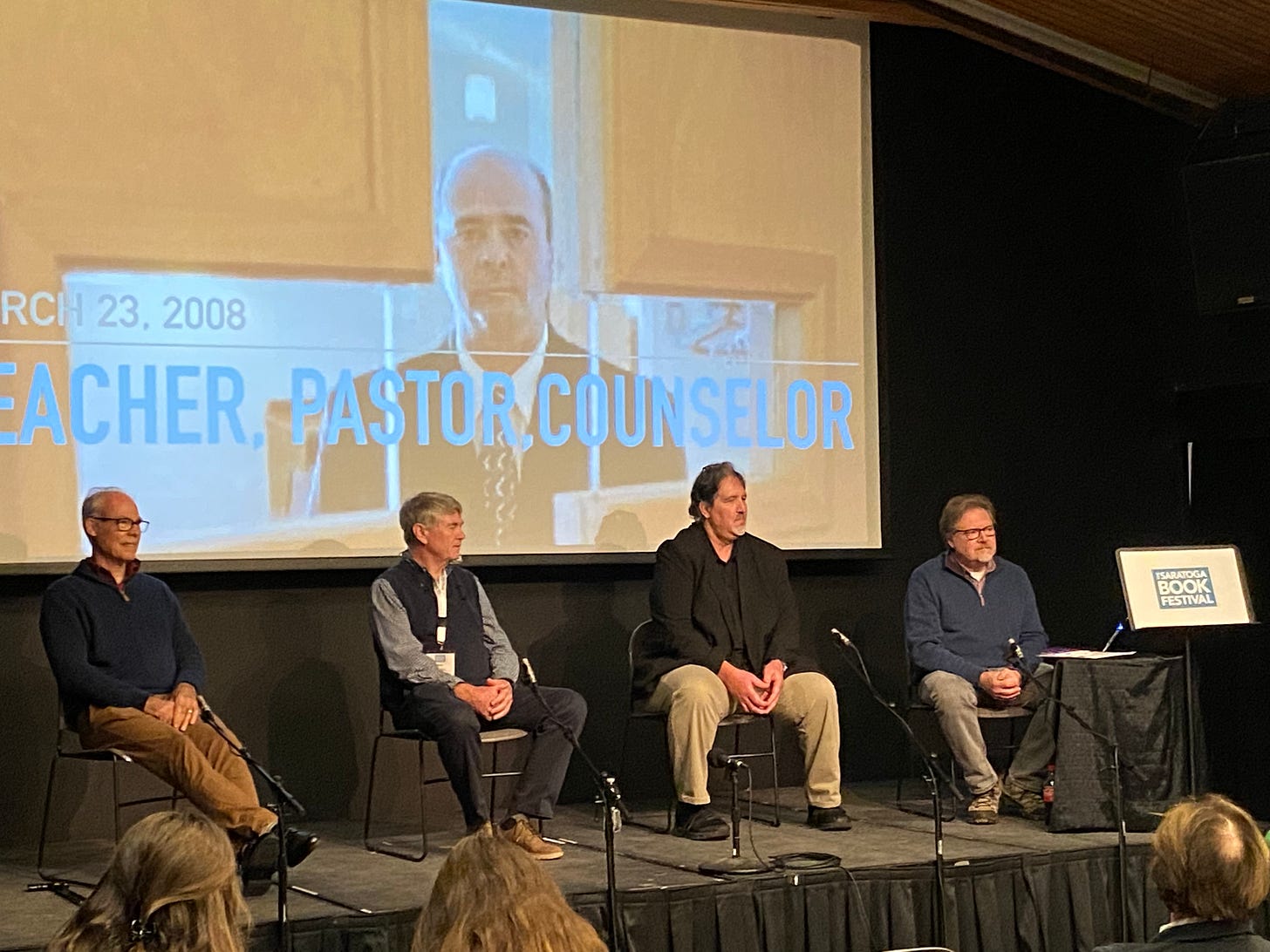By Ken Tingley
The Dee Sarno Theater in downtown Saratoga Springs was filled with newspaper people Saturday morning.
That was encouraging.
Sure, I’d like to think they packed the place because they heard about my book “The Last American Newspaper,” but I knew that was not the case.
While the panel discussion was part of the Saratoga Book Festival, it was billed as a discussion about the future of newspapers. My former colleagues, Will Doolittle and Pulitzer Prize winner Mark Mahoney joined me on the stage along with moderator Eric Hoppel, the former news director at channel 13 in Albany.
We talked about the the work the three of us had done over two decades at The Post-Star in Glens Falls.
We talked about Mark’s Pulitzer Prize for demanding local municipalities to be open and more accessible to citizens.
We talked about Will’s award-winning podcast about his wife’s early-onset Alzheimer’s diagnosis at age 59.

What struck me looking out at all those filled auditorium seats was the rapt attention we were getting and how serious everyone looked.
It was concern, I believe.
There were some familiar faces, Post-Star reporters and editors who had moved on to other publications and other professions, but there were many new faces, people who did not know of our work who we were meeting for the first time. They wanted to know what the future held.
I explained my book was intended to remind newspaper readers of the great journalism done in the past, the dedication of the reporters and editors trying to make a difference in the world, but maybe most importantly of all, how their work changed their communities and made them better places to live.
It was the newspaper which often led the conversation about community problems like underage drinking, suicide, domestic violence and heroin addition and how they should be addressed.
There was concern on those faces.
Some nodded.
Others shook their head.

Someone asked what the solution was. If the old newspaper business model was broken, then how will journalists be allowed to help their communities again.
I had been asked the question before.
At first, I responded that readers who routinely spend hundreds of dollars for cable television, Wifi access and cellular phone services also need to spend the same amount of money on news media they can trust. Journalism is expensive and you can’t get it for free.
I explained that some communities are experimenting with non-profit news models funded by rich community donors who are concerned about the demise of journalism.
Steve Thurston, who runs the Foothills Business Daily (foothillsbusinessdaily.com) told me I should have mentioned the Local Independent Online News business model that he follows. He said he was a small player there, but it is another option that has potential. Thurston’s publication often has community news the local newspaper does not.
The moderator Hoppel said at one point that my book was something that could help save democracy. That is high praise, but perhaps overstated. I’d like to think it is the starting point for that conversation, a reminder of what journalism contributed to our communities and what it can contribute again.
Consider it a breaking news alert.
My concern is that we have not hit rock bottom yet.
Only when the corruption and secrecy of government overwhelm us and our taxes skyrocket will people respond. Maybe not even then.
But the fact that so many people responded on a beautiful Saturday morning to hear from three editors who always gave it their all was encouraging.
At least for an hour.
Hypocrisy on display
North County Public Radio also called out Rep. Elise Stefanik for standing in front of a sign wildly understood to mean “f*** Joe Biden.”
It reported this type of behavior is becoming increasingly more acceptable and Rep. Stefanik’s attacks on Democrats have become increasingly more aggressive.
But NCPR also pointed out that Stefanik used to stand for something much different.
In 2016 she said, “I went to work. With Republicans and Democrats, we passed much-needed legislation.”
While Stefanik repeatedly touts her bipartisan mission, that has not been the case of late.
NCPR reported that a recent analysis by the Lugar Center – a nonprofit that ranks members of Congress based on their ability to work across party lines – finds she has become less bipartisan over time.
In 2019-20, she was ranked the 13th most bipartisan member of Congress.
In 2021, she fell to 100th place.
New columnist
If you were a regular reader of The Post-Star, you will be familiar with Will Doolittle’s award-winning journalism and his column.
He retired in 2021 and has been working on a book. He was also the primary editor on my most recent book. This week I convinced him he should get back to writing a column and join me on The Front Page. His first column appeared in your email box on Sunday.
Will hopes to write a weekly Sunday column for now, but perhaps we all can convince him to write even more.
I’ve become convinced as more and more publications have dropped their columns and editorials that there is a void that needs to be filled. Will and I both have four decades of institutional knowledge to provide context and insights into the world and our community.
This newsletter has been growing rapidly in recent months and that shows the interest is there. Please welcome Will, spread the word and keep on reading.
More events
For those that missed the great event at the Saratoga Book Festival, there are more events coming up.
On Wednesday, Nov. 9 I will be sitting down for an interview with Joe Donahue of WAMC at Battenkill Books in Cambridge.
The event will start at 6 p.m.
And on Thursday, Nov. 17, Will Doolittle, Mark Mahoney and myself will reprise our conversation on newspapers at Crandall Public Library in Glens Falls. We’re hoping to get others to join us.









Not sure what it says about our society when newspapers and mainline churches are dying from lack of support. It’s probably not good, tho.
The "press," both print and media, has been considered the Fourth Estate - the watchdog of our constitution and as such, forms a vital part of a democratic government. I happen to think it's true. This is an awesome responsibility. It requires courage and an abiding sense of justice, equity and search for truth, no matter where it leads, by those that undertake this noble profession. Sadly, many no longer trust our government institutions or the press. We must find a way out this crisis, and I believe it has to start with the Fourth Estate, if we are to have a chance of turning things around. This is no easy task. It will take real self examination and reflection. I think it begins by recognizing that people do think the press, both print and media, are biased. Why else do we easily label newspapers or television news right or left leaning, blue or red? The New York Times leans left or blue, The New York Post right or red. I know we can do it. I was privileged to serve as the citizen representative on the Post-Star's editorial board twice, once in 2009 and again in 2019. I witnessed journalists putting aside personal views, and discussing issues on the merits and examining facts. So I know it can be done.